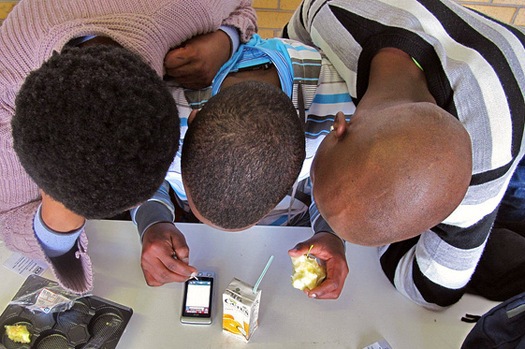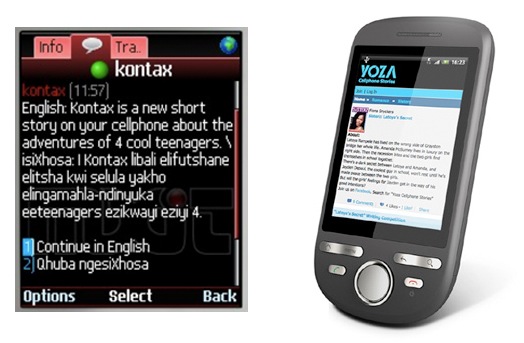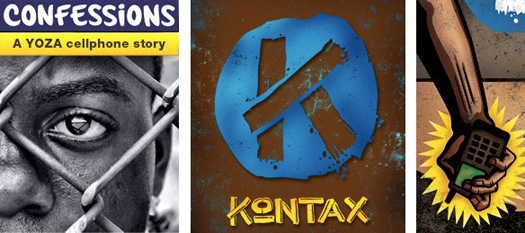
Reading and responding to Yoza's content. All images courtesy Yoza.
“I must admit that I wake up extra early to read the chapters (blushing) I never use to go to the library but… i feel like i have a library on my phone and its great , YAY!” — Yoza reader
Designed to encourage reading, writing and responding, Yoza engages African youth with stories and social issues. The project, which was spearheaded by Steve Vosloo, a technology researcher in Cape Town, and financed by South Africa’s Shuttleworth Foundation, is dedicated to a participatory culture hungry for micro-doses of literature that are accessible as pixels not paper.
Officially launched last September, Yoza is based on Vosloo’s observations that African youth are book-poor yet mobile-rich. An estimated 90 percent of urban South African youth have access to cell phones, and 70 percent of those phones are web-enabled. In stark contrast, more than half of South African households own no leisure books and only 7 percent of public schools have functional libraries.
Yoza’s first story, Kontax, was released experimentally in 2009. Written by Sam Wilson, an author and scriptwriter, Kontax followed the adventures of a local graffiti crew around Cape Town. Its 20 pages were initially published over a month of daily dispatches via a mobisite and later on the popular MXit social network. Each episode, released in both English and isiXhosha, was around 400 words long. Prizes were offered for the best readers’ comments and sequel ideas.

Yoza content on MXit social network (left) and on a mobisite (right).
Via Yoza, 17,000 users accessed the full premiere Kontax series — well eclipsing the South African “best-seller” standard of 5,000 book sales. Each chapter costs the reader around 1 US cent to download. Explains Vosloo, “Mobile data is cheap relative to voice and SMS — and of course, books. It’s also about access.” According to Vosloo, readership exploded when Yoza was made available to MXit’s 15 million local subscribers — a share currently far greater than Facebook’s.

Yoza story illustrations.
The comments allow Vosloo to stay in touch with what readers want. “It’s become clear that youth are keen to be both educated and entertained,” he notes. “We get many requests for stories which are relevant to their lives. We’ve had requests for story lines which cover drugs and teen pregnancy, careers, money and more.” Feedback has helped to shape several narratives in the works, including Streetskillz, which is set during the South African–hosted World Cup soccer matches; Sisterz, which explores dark family secrets and teenage life; and Confessions of a Virgin Loser, which follows a boy steering his way through the complications of peer pressure, teenage sex and HIV/AIDS. Social issues provide a further avenue for interaction. A story that touched on domestic violence elicited a slew of comments in support of the affected character as well as personal accounts.
Alongside content derived from popular culture, Yoza has published versions of classics from Shakespeare to Wordsworth. Feedback from teachers in low-income schools tells of class assignments given in conjunction with Yoza content and applauds the access to literature the platform has provided. Comments across the site (often in text-speak) reveal an engaged audience ready to amend mistakes that have eluded Yoza’s editors.
Looking to the future, Vosloo has been speaking with potential sponsors; he approached one bank about a series that would weave financial literacy into its storyline. Sponsors are attracted to a medium that stimulates appetite by releasing stories in installments before making the entire series available on a website, where it continues to attract commentary. “It’s a bit like the transition from a box-office to DVD release,” Vosloo says. “There’s the initial rush to devour a fresh feature yet the legacy contributes to a growing library of accessible content.”


Comments [2]
02.22.11
12:11
02.28.11
03:44